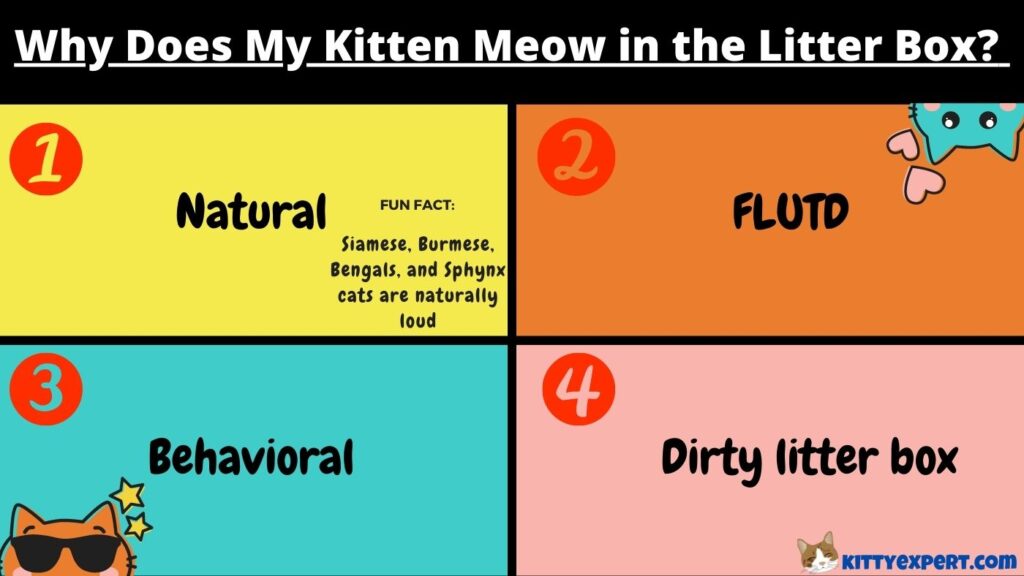Using the litter box can be a very noisy experience for some cats. Meowing in the litter box can indicate various things, and while it is usually just natural behavior, it could indicate something more severe. In this article, we will answer the question, “Why does my kitten meow in the litter box?”
Why Does My Kitten Meow in the Litter Box?
Meowing in the litter box is normal for kittens; however, if the meowing is accompanied by howling or crying, it could indicate a medical problem.
It is possible that your kitten is suffering from Feline Lower Urinary Tract Disorder (FLUTD). FLUTD is a catch-all term for a variety of urinary issues, including inflammation, urethral blockage, constipation, and struvite crystals.
Inflammation
If your kitten has a bacterial infection, it may develop an inflamed urinary tract or bladder. This makes it extremely difficult for your kitten to pee. It can cause your cat going to the litter box every few minutes.
If you suspect a bacterial infection, take your kitten to a veterinarian so it can be tested and prescribed antibiotics. Stress can also cause inflammation in cats. This is a condition known as Feline Idiopathic Cystitis (FIC). Stress in kittens can be caused by various factors, including a new housemate, a new environment, etc.
It can eventually lead to your kitten peeing in your bed while you’re sleeping.
Blocked Urethra
This condition primarily affects male cats and kittens, but it is extremely dangerous and can be fatal. Your kitten will be unable to pee if its urethra is blocked. As a result, its bladder swells and becomes extremely painful. If you suspect your kitten has a blocked urethra, take it to a veterinarian immediately. If not treated immediately, a blocked urethra can lead to acute kidney failure in 2 to 3 days.
Constipation
Constipation is less common in kittens, but it is a condition associated with FLUTD. It can be caused by foreign body consumption, pelvic injuries, obesity, weak colon muscles, and even hairballs. This condition can be excruciatingly painful for cats, and treatment will vary depending on the cause.
Struvite Crystals
Struvite Crystals, also known as crystals in the urine, can occur if your kitten’s diet is too acidic, they are not adequately hydrated, or they are simply prone to crystals. Low levels of crystals are usual in urine, but they cause problems when they combine to form tiny stones. These tiny stones can scratch the urethra’s internal surface, causing a stinging pain whenever your kitten pees. If you suspect your kitten has struvite crystals, take it to a veterinarian right away so it can be examined and treated.
You can also feed your cat certain types of food to help with crystals.
Behavioral reasons
In addition to medical reasons, your kitten may meow in its litter box for behavioral reasons. Kittens meow when they want to be protected or when they want to warn predators away. This is simply a survival instinct, and while it can become quite loud, it is entirely natural behavior.
Another behavioral explanation could be stress. Many kittens and cats can become stressed for various reasons, including a new family member, a new environment, a change in diet, a dirty litter box, switching cat litter, and so on. Determine what is causing your kitten’s stress to reduce its meowing in the litter box. High-stress levels can also lead to more severe problems, so you should address the source as soon as possible.
Dirty litter box
Next, a dirty litter box could be the source of the loud meowing. Remember to clean the litter box on a regular basis so that it is pleasant for your kitten to use. A dirty litter box is also a major source of stress for your kitten, so keeping it clean may minimize the amount of noise your kitten makes.
Remember that a dirty litterbox can also cause bacterial infections, ammonia exposure, and the risk of toxoplasmosis.
Vocal breed
The final and most obvious explanation is that your kitten is vocal. Many cat breeds are incredibly vocal, including Siamese, Burmese, Bengals, Sphynx, and Oriental Shorthairs. It’s just a part of their personality, and you can’t change it.
How to stop your kitten from meowing in the litter box?
Consider the following suggestions to reduce the meowing of your kitten in the litter box:
- Check with your veterinarian. It is best to rule out any type of FLUTD, so speaking with your veterinarian is a good idea. You will be able to solve the problem much faster if you take your kitten to the vet right away.
- Lower stress levels. While some things will take more time, such as a new environment or housemate, other measures can reduce your kitten’s stress. This can include cleaning its litter box regularly, keeping the litter it prefers, feeding it the food and treats it likes, and so on. A happy kitten is a peaceful home in this scenario.
Conclusion
If your kitten has always meowed in the litter box from the start, it could simply be a part of their distinct personality. However, if this is new behavior, keep an eye on them. Check if they are howling or crying in addition to meowing, as this could indicate pain. If you have any extreme worries, contact your veterinarian right away.
Understanding why your kitten meows in the litter box can help you establish a greater connection with it and assist it when it is in need. Most of the time, it is simply natural behavior, but it is also essential to investigate the medical aspects. Hopefully, this article answered the question, “Why does my kitten meow in the litter box?”

